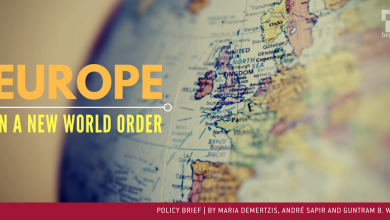Versions of this article were published in Politico, Nikkei Veritas, Caixin, Caixin(English) and Die Zeit.
Global trade tensions have steadily increased since President Donald Trump took office at the beginning of 2017. Initially, the US president seemed to want to confront US allies and China alike. But the tensions between the US and the EU have recently calmed, while the US focus has moved squarely towards China.
So far this has culminated in the announcement of a 10% tariff on $200 billion-worth of imports from China, and the threat of increasing that tariff to 25% if China does not end its “unfair” trading practices. China, in turn, has announced counter-tariffs on some $60 billion-worth of imports.
Many political motivations on the part of the US administration can be seen behind this move: an attempt to contain China’s rise, including as a technology leader in the context of China’s 2025 strategy; a clear perception that since China’s entry to the WTO, many jobs were lost in sectors exposed to Chinese competition; a realisation that the EU remains a long-standing ally of the US – despite its trade surplus. The successful negotiation of Commission president Jean-Claude Juncker has also helped to ease the EU-US tensions, though the truce remains fragile.
Given this picture, could Europe benefit from the US-China trade tensions and if so how? As a first principle, trade wars are not only easy to lose for the sides involved but they also have negative effects for companies in third countries due to globally integrated supply chains. Daimler, for example, blamed a recent profit warning on the China-US trade war as exports of cars and components would become more expensive.
But trade wars also create opportunities for some companies and sectors in third countries. Most immediately, one might see European exports to China increase, for example because China needs to replace agricultural imports from the US. There may also be trade gains in other sectors where tariffs limit imports. But the more sophisticated the products get, the more global supply chains will play a role. But I could still see a number of European companies, for example delivering consumer goods, benefits from rising export opportunities to the US.
But the real opportunity for Europe lies elsewhere. As China feels the pressure from the US, it is trying to make new allies. True, China may be less vulnerable to a trade war now than few years ago thanks to the rebalancing of its economy away from exports. But China is still worried to see a united front of Japan, US and EU, such as seen with the recent declaration on forced technology transfer that was clearly targeted at China.
China is therefore actively reaching out to the EU, trying to advance talks on bilateral investment, aiming to start negotiations on a trade agreement. China would also like to see the EU as a strategic partner in the World Trade Organisation.
Europe should actively pursue that opportunity and negotiate with China, but it needs to be realistic on what it can achieve. Europe’s key interests are clear: China needs to open up its markets to more sectors. European investment to China is now falling for a number of years because market access has become more difficult. Europe needs to ensure that China treats European companies on equal footing to their domestic ones. Also, China needs to remove unfair subsidy schemes through state owned banks and other state owned companies. Of course, China will not fundamentally alter its economic model. But will it be ready to make some concessions to European firms? The EU should certainly explore this opportunity.
Finally, as China has found it more difficult to invest in the US, particularly in key technological sectors, it has moved its investment efforts to Europe. Chinese investment in key European industrial technology sectors, such as Industry 4.0, has increased substantially.
European companies and politicians have observed this rise with mixed feelings. Of course, Chinese investment is welcome and can increase corporate profits, especially when access to Chinese markets is improved. But there is a clear worry that China uses market manipulation and subsidies to buy companies at unfair prices.
What’s more, the industrial policy implications of Chinese investment are increasingly the focus of public debate. Does Europe lose out on key technologies? Aren’t some technologies too sensitive from a security perspective to be exposed to China? The EU clearly needs to define its red lines on Chinese technology acquisition and has the leeway to enforce them more vigorously.
The overall upshot is clear. Europe will benefit from US-China tensions with increased exports in specific sectors but will lose in others. But the main opportunity lies in re-starting the negotiations with China. The EU needs to now clearly formulate a unified strategic position and explore the opportunity.


